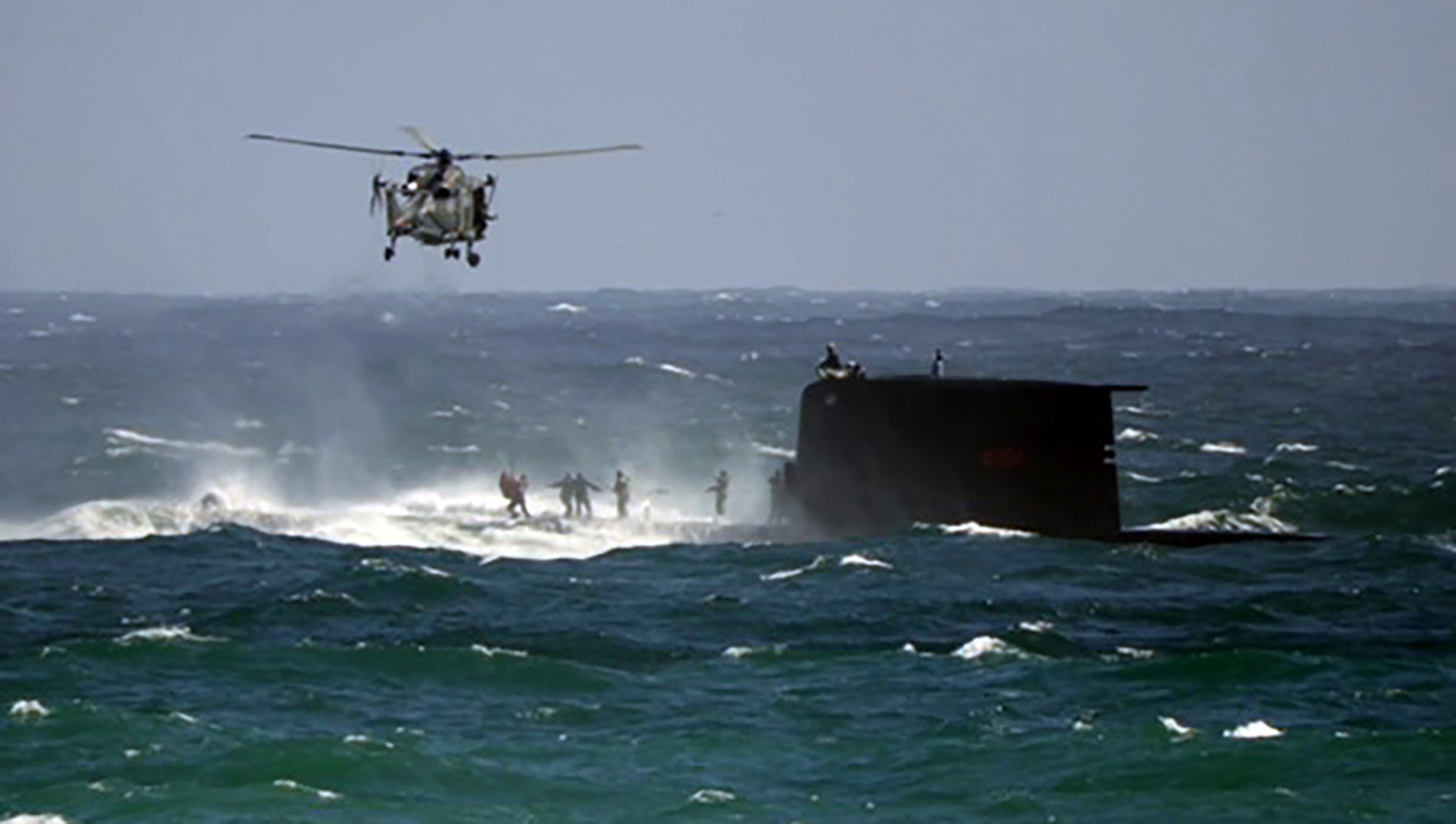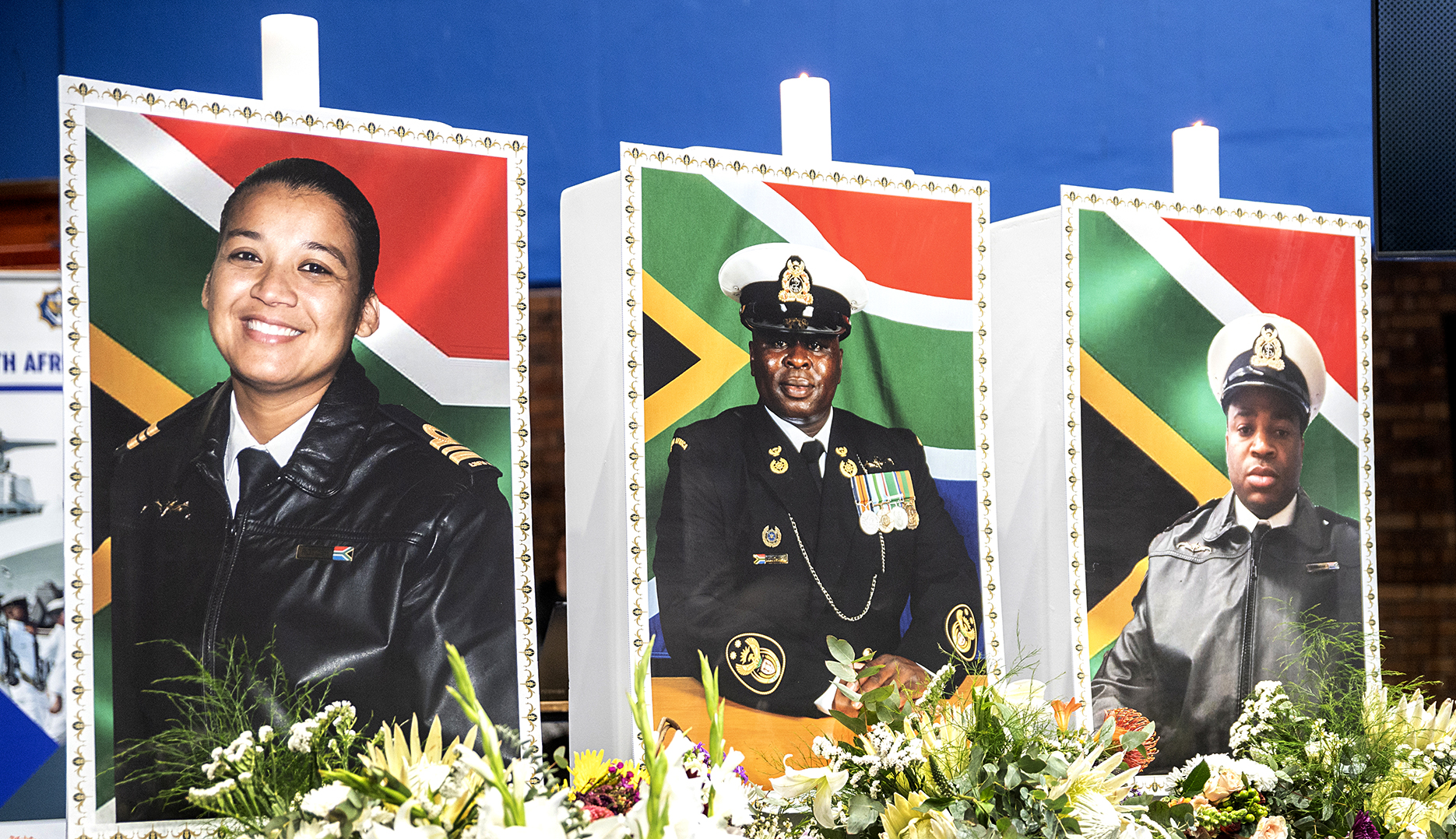It’s been a year since three submariners died in an incident involving the South African Navy submarine SAS ’Manthatisi, and the recent release of an inquiry’s findings into the incident has left a host of unanswered questions.
 The SA Navy submarine disaster plays out off Kommetjie, Cape Town. (Photo: Chris Binnington)
The SA Navy submarine disaster plays out off Kommetjie, Cape Town. (Photo: Chris Binnington)
 The SA Navy submarine disaster off Kommetjie, Cape Town. (Photo: Chris Binnington)
The SA Navy submarine disaster off Kommetjie, Cape Town. (Photo: Chris Binnington)
Master Warrant Officer William Mathipa, Warrant Officer Class One Mmokwapa Mojela and Lieutenant Commander Gillian Hector died on 20 September 2023 when high waves swept seven crew members of the SAS ’Manthatisi submarine overboard.
On Friday morning, 20 September, there will be a ceremony to commemorate them, during which the SA Navy will rename the submarine building at the Simon’s Town Naval Base.
“The ceremony aims to commemorate the fallen submariners and provide a space for reflection and respect for the families and the broader SA Navy affected by the accident,” the SA Navy said on Thursday night.
At the time of the disaster, the SAS ’Manthatisi was en route to Table Bay from Simon’s Town for a South African Navy Festival, which was scheduled to take place from 23-25 September 2023.
The submarine was offshore of Kommetjie, Cape Town, when the incident occurred at around 2.30pm. Rescue operations saved the lives of five personnel.
The submariners were conducting a vertical transfer (Vertrep) exercise involving a South African Air Force maritime Lynx helicopter and the SAS ’Manthatisi when huge waves swept them overboard. A Vertrep is a method of supplying seaborne vessels by helicopter.
The incident occurred days after strong winds, high waves and a spring tide damaged infrastructure and forced people away from the coastal areas of the Western Cape and KwaZulu-Natal. A South African Weather Service warning of damaging winds had been issued for the City of Cape Town and Cape Point on the day the accident occurred.
 Candles and flowers for the deceased sailors at the SA Navy museum before their memorial service in Cape Town on 27 September 2023. (Photo: Gallo Images / Brenton Geach)
Candles and flowers for the deceased sailors at the SA Navy museum before their memorial service in Cape Town on 27 September 2023. (Photo: Gallo Images / Brenton Geach)
Witnesses of the rescue operations in Kommetjie told Daily Maverick that the swells off the coast were huge that day.
In the aftermath of the disaster, there were many questions, not only about the decision for a Vertrep exercise to be conducted in those conditions but also about adequate training and preparedness, emergency responses and who, if anyone, would be held accountable.
SA Navy authorities had stressed that all safety measures were in place before the incident and the crew onboard the SAS ’Manthatisi were all properly trained.
Investigation findings
A board of inquiry was set up to probe the incident and the SA Navy chief, Vice-Admiral Monde Lobese, said in September 2023 that its findings would not be kept secret.
While Lobese released a summary of the board’s findings this month, it’s unclear whether the full report into the incident will ever be made public.
Daily Maverick sent questions to the SA Navy but had not received a response by the time of publication. A response will be added once it is received.
In a statement on 6 September, Lobese suggested the tragic incident could not have been prevented.
“It was just the submarine was at the right place at the wrong time when Mother Nature had the final word,” he said.
Lobese said that on the day of the disaster, the SAS ’Manthatisi had been authorised to carry out multiple exercises, including the Vertrep.
“The weather on the day was manageable and the Vertrep had previously been completed in comparable to worse weather circumstances. The Vertrep was approved by the Officers Commanding of the submarine and helicopter,” he said.
However, the Vertrep could not be finalised because the participants were unable to get two submariners on the submarine hull, said Lobese.
“The exercise was thus called off by both parties and the members were hoisted back into the helicopter. Just as everyone was about to get back into the submarine, the sea conditions changed abruptly, resulting in unexpected freak waves.”
Hector, Mathipa, Mojela and another submariner were swept overboard by a freak wave, said Lobese.
Read more: Badges of honour — Navy pays tribute to three fallen submariners
Chief of the Sa Navy’s Statement on the Late Submariners’ Board of Inquiry.
“Everyone was still attached to the safety line, when [Hector] bumped her head against the submarine’s hull, rendering her unconscious. With the assistance of the safety swimmer, everyone managed to get back on to the casing. [Hector] was resuscitated and started to breathe. Everyone was fine; Mathipa and Mojela unclipped their safety lines to go back into the submarine.
“Just as they proceeded back to the submarine, another freak wave washed them overboard. It was only [Hector] that was still attached to the safety line. At this stage, members of the crew came to assist their comrades. As they were pulling them out another freak wave hit them, washing them away and dispersing them,” he explained.
Dead on the scene
Crew members hoisted Hector out of the water and back on the submarine where a medic attended to her, while the others in the water were rescued by the National Sea Rescue Institute (NSRI). However, Hector was later declared dead on the scene.
The NSRI conducted CPR on Mathipa and Mojela, but to no avail.
“The severity and force of the freak waves, the foul weather gear that becomes heavy when wet and the movement of the boat pushing the members to and fro in the cold sea conditions took its toll on the members; it drained their energy to such an extent that they could only float and wait to be rescued,” said Lobese.
He boiled down the issues uncovered by the board to three: life jackets, the safety line and the submarine’s surface operations doctrine.
He said the life jackets were standard, 120kg life vests, which had since been “modernised and improved” to handle 270kg and survive rough sea conditions.
The safety line, which the board found had been too long to carry many people at the same time, had been “improved to ensure that it would not stretch and it would be capable of handling five members at the same time”.
The doctrine had also been amended, said Lobese.
“Since the doctrine never required the casing party to wear safety headgear, this requirement is now included as part of the gear once you step on the casing. With the ‘man overboard’ exercises, the doctrine did not provide for a man overboard locator beacon. This will now become part of the doctrine. We will also ensure that the rescue man that is utilised on the submarine is not only conversant with water but also needs to be a strong swimmer.
“Even if all of the lessons learnt had been implemented and all corrective actions had been done prior to this evolution, there is simply no way to ensure that the outcome would have been different due to the aforementioned negative circumstances,” he said.
Systemic failures and remaining questions
Lobese alluded to the impact of budget cuts on the training and experience of submariners.
The maritime defence (SA Navy) budget for 2024/25 is R4.4-billion, while the air defence budget is R6.6-billion and the military health services budget is R5.8-billion. Landward defence has the biggest budget of the defence branches, at R17-billion.
“The sailors are eager to undertake training and conduct exercises since they don’t know when they will have another opportunity. This is due to ongoing budget constraints that impede platform or vessel maintenance, resulting in reduced sea time, which impedes training and, ultimately, experience,” said Lobese.
“Due to platform non-availability, restricted hours available, procurement delays, inability to procure, and maintenance challenges with platforms and vessels, any opportunity to exercise is welcome,” he continued.
Read more: Submarine tragedy a ‘wake-up call’ to government to stop slashing defence budget, says SA Navy chief
African Defence Review director Darren Olivier told Daily Maverick there were still many questions about the decision-making taken on the afternoon of 20 September 2023.
“Some of the questions I’d like to have seen answered were: What was the specific safety doctrine regarding the use of the safety line? Knowing the variability of the weather conditions and waves in that area, why was it decided to do the Vertrep there in particular, and is it a location that has been used for previous such exercises?
“What was the provision for rescue boats and similar nearby, given that Vertreps are not exercised often? Finally, what drove the doctrinal choice to have 120kg life jackets rather than more capable and buoyant ones? Will there be mobility implications with the new vests?” he asked.
Oliver added that it was, however, encouraging that the SA Navy was “avoiding a blame game” and not placing sole responsibility on the submarine’s crew.
“No tragedy happens in isolation… Tragedies like this often stem from systemic factors shaped by decisions made long before by individuals far removed from the crew. The improvements that the Navy said they will make in equipment and surface operations doctrine are very welcome and seem sensible. It’s also welcome to see some findings made public.
“However, the information released so far is not really sufficient to reassure the public that all contributing factors have been fully examined. Submarine operations are inherently dangerous, so all related decision-making must always be beyond reproach,” said Olivier. DM




 Candles and flowers for the deceased sailors at the SA Navy museum before their memorial service in Cape Town on 27 September 2023. (Photo: Gallo Images / Brenton Geach)
Candles and flowers for the deceased sailors at the SA Navy museum before their memorial service in Cape Town on 27 September 2023. (Photo: Gallo Images / Brenton Geach)